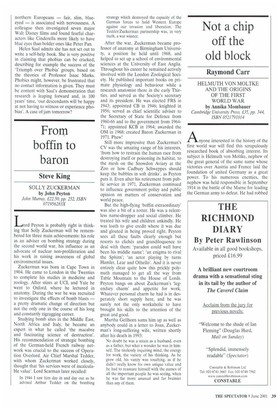From boffin to baron
Steve King
SOLLY ZUCICERMAN by John Peyton John Murray, £22.50, pp. 252, ISBN 071956283X Lord Peyton is probably right in thinking that Solly Zuckerman will be remembered for three main achievements; his role as an adviser on bombing strategy during the second world war, his influence as an advocate of nuclear non-proliferation and his work in raising awareness of global environmental issues.
Zuckerman was born in Cape Town in 1904. He came to London in the Twenties to complete his studies in medicine and zoology. After stints at UCL and Yale he went to Oxford, where he lectured in anatomy. During the war he was recruited to investigate the effects of bomb blasts — a pretty dramatic change of direction but not the only one in the course of his long and constantly zigzagging career.
Studying bomb sites in the Middle East, North Africa and Italy, he became an expert in what he called 'the macabre and fascinating science of destruction'. His recommendation of strategic bombing of the German-held French railway network was crucial to the success of Operation Overlord. Air Chief Marshal Tedder, with whom Zuckerman worked closely, thought that 'his services were of incalculable value'. Lord Scarman later recalled:
In 1944 I saw him day in and day out as he advised Arthur Tedder on the bombing
strategy which destroyed the capacity of the German forces to hold Western Europe against our invasion and liberation. The Tedder/Zuckerman partnership was, in very truth, a war winner.
After the war, Zuckerman became professor of anatomy at Birmingham University, a position he held until 1968, and helped to set up a school of environmental sciences at the University of East Anglia. Throughout his career he remained actively involved with the London Zoological Society. He published important books on primate physiology and behaviour while a research anatomist there in the early Thirties, and served as the Society's secretary and its president. He was elected FRS in 1943; appointed CB in 1946; knighted in 1956; served as chief scientific adviser to the Secretary of State for Defence from 1960-66 and to the government from 196471; appointed KCB in 1964; awarded the OM in 1968; created Baron Zuckerman in 1971. Phew!
Still more impressive than Zuckerman's CV was the amazing range of his interests, 'from how to restrain the human race from destroying itself or poisoning its habitat, to the mesh on the Snowdon Aviary at the Zoo or how Cadbury Schweppes should keep the bubbles in soft drinks', as Peyton puts it. Even after his retirement from public service in 1971, Zuckerman continued to influence government policy and public opinion on matters of conservation and world peace.
But the high-flying 'boffin extraordinary' was also a bit of a rotter. He was a relentless name-dropper and social climber. He treated his wife and children unkindly. He was loath to give credit where it was due and gloated in being proved right. Peyton sees all these faults clearly enough but resorts to clichés and grandiloquence to deal with them: 'paradox could well have been his middle name'; 'an enigma to rival the Sphinx'; 'an actor playing by turns Hamlet, Lear and Othello'. And it is never entirely clear quite how this prickly polymath managed to get all the way from Table Mountain to the House of Lords. Peyton bangs on about Zuckerman's 'legendary charm' and appetite for work. Whatever personal charm he had is in desperately short supply here, and he was surely not the only workaholic to have brought his skills to the attention of the great and good.
Martha Gellhorn sums him up as well as anybody could in a letter to Joan, Zuckerman's long-suffering wife, written shortly after his death in 1993:
No doubt he was a strain as a husband. even as a father, but what a wonder he was in himself. The tirelessly inquiring mind, the energy for work, the variety of his thinking. As he grew old, his vanity was touching, as if he didn't really know his own unique value and he had to reassure himself with the names of all the important people he was seeing, when he was far more unusual and far brainier than any of them.


































































 Previous page
Previous page